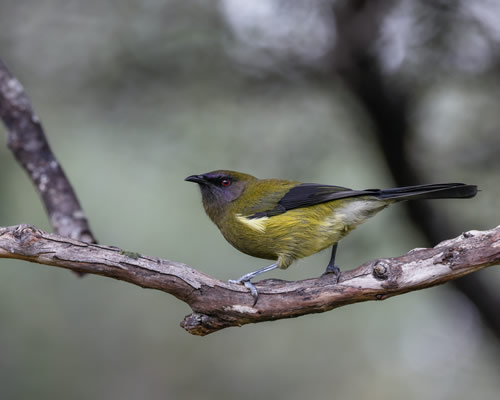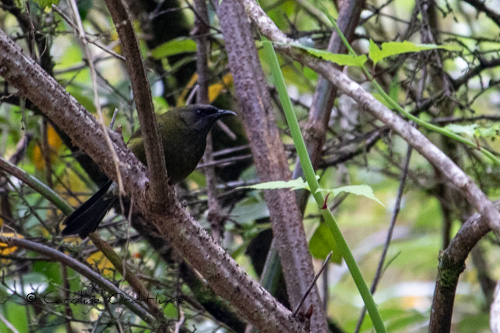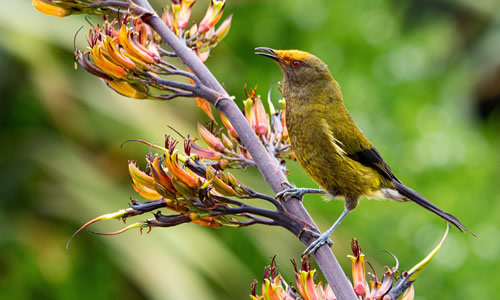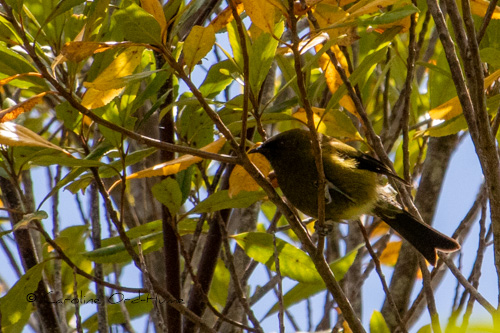New Zealand Bellbird Korimako (Anthornis melanura)
Among the chorus of native birds, the New Zealand Bellbird (Anthornis melanura), known locally as the Korimako, stands out as a true icon of the country's unique avian biodiversity. In the enchanting forests of New Zealand, a melodious avian symphony plays, captivating anyone fortunate enough to hear it.

Photo by Tony Stoddard
With its striking Bellbird plumage, sweet songs, and ecological significance, the New Zealand Bellbird is a creature of fascination and importance. Delve into the world of this captivating bird and explore its vital role in New Zealand's ecosystems.
Species Name and Family
Name: Bellbird | Korimako
Scientific Name: Anthornis melanura
Order: Passeriformes
Family: Meliphagidae
Status: Endemic, New Zealand
Conservation: Not Threatened
Geographical subspecies:
Three Kings Bellbird Anthornis melanura obscura (At Risk)
Poor Knights Bellbird Anthornis melanura oneho (At Risk)
Bellbird Anthornis melanura melanura (Not Threatened)
Extinct subspecies: Chatham Island Bellbird Anthornis melanura melanocephala
Other Names
The New Zealand Bellbird (Anthornis melanura) is known by several other names in addition to its common name. These names can vary depending on the region and local dialects in New Zealand. Here are some alternative names for the Bellbird:
- Bell Bird
- Korimako: This is the Māori name for the Bellbird and is commonly used in New Zealand.
- Makomako and Kōmako: Two more Māori names for the Bellbird.
Bellbird Physical Characteristics and Identification
The New Zealand Bellbird is a medium-sized passerine bird, measuring around 23 centimetres in length and weighing between 30-40 grams. Its plumage varies between subspecies but often displays a combination of vibrant green, iridescent blue, and white.
The distinguishing feature is its bright crimson eye, which gives the Bellbird a striking and almost otherworldly appearance.
Korimako Bellbird in the Bush, New Zealand

Related Content...
Native New Zealand bird species and a list of New Zealand wild animals
Habitat and Range
Bellbirds are endemic to New Zealand, which means they are found nowhere else in the world. They inhabit a variety of environments, from dense native forests to coastal scrub lands. However, they are most commonly associated with the lush native forests of New Zealand.
Diet and Feeding Habits
New Zealand Bellbirds primarily feed on nectar from native flowers, making them vital pollinators in their ecosystems. Their long, slender bills are perfectly adapted for extracting nectar from flowers, which they do with great precision.
In addition to nectar, they also consume insects and spiders, providing an essential pest control service for the forests they inhabit.

Photo by Tonia Kraakman
New Zealand Bellbird Song
One of the most enchanting aspects of the New Zealand Bellbird is its melodious song. Their calls are a symphony of clear, bell-like notes, giving them their common name. These songs serve various purposes, including territorial defence and attracting mates.
The Bellbird's song is a delightful and distinctive feature of New Zealand's natural soundscape.
Listen to the Sounds of New Zealand Bellbirds / Korimako courtesy of Department of Conservation NZ
Bellbird/korimako group of 5 adults on Little Barrier Island (MP3, 2,821K) (opens in new window)
Bellbird/korimako adult male (MP3, 561K) (opens in new window)
Bellbird/korimako adult alarm call (MP3, 1,300K) (opens in new window)
Ecological Importance of the New Zealand Bellbird / Korimako
The New Zealand Bellbird plays a crucial role in maintaining the health and diversity of New Zealand's forests. As pollinators, they facilitate the reproduction of numerous native plants, many of which rely exclusively on their services for pollination.
This mutualistic relationship between Bellbirds and native flora underscores the bird's ecological significance.
New Zealand Bellbird Korimako

Moreover, Bellbirds contribute to the control of insect populations in their habitat, helping to maintain the delicate balance of New Zealand's ecosystems. Their diet includes insects and spiders, which can be pests to the native flora.
Bellbird Conservation Status and Threats
While the New Zealand Bellbird (Korimako) is not considered globally threatened, it has faced historical challenges due to habitat destruction and the introduction of invasive species, such as rats and stoats.
Conservation efforts in New Zealand aim to protect the native forests and the birds that call them home, including the Bellbird. Predator control programs have been instrumental in helping these birds recover in some areas.
New Zealand Bellbird and the Future
The New Zealand Bellbird, Korimako, (Anthornis melanura), with its stunning appearance, sweet song, and ecological significance, holds a special place in the hearts of New Zealanders and nature enthusiasts. Its role as a pollinator and pest controller in native forests underscores its importance in maintaining the health and diversity of New Zealand's ecosystems. As efforts to protect and restore these ecosystems continue, the melodious call of the Bellbird will hopefully remain a symbol of New Zealand's unique natural heritage for generations to come.
More Birds and wildlife in New Zealand...
List of native New Zealand bird species and a list of wild animals in and around New Zealand
References
- Department of Conservation - Sound Files
- NZ Birds Online